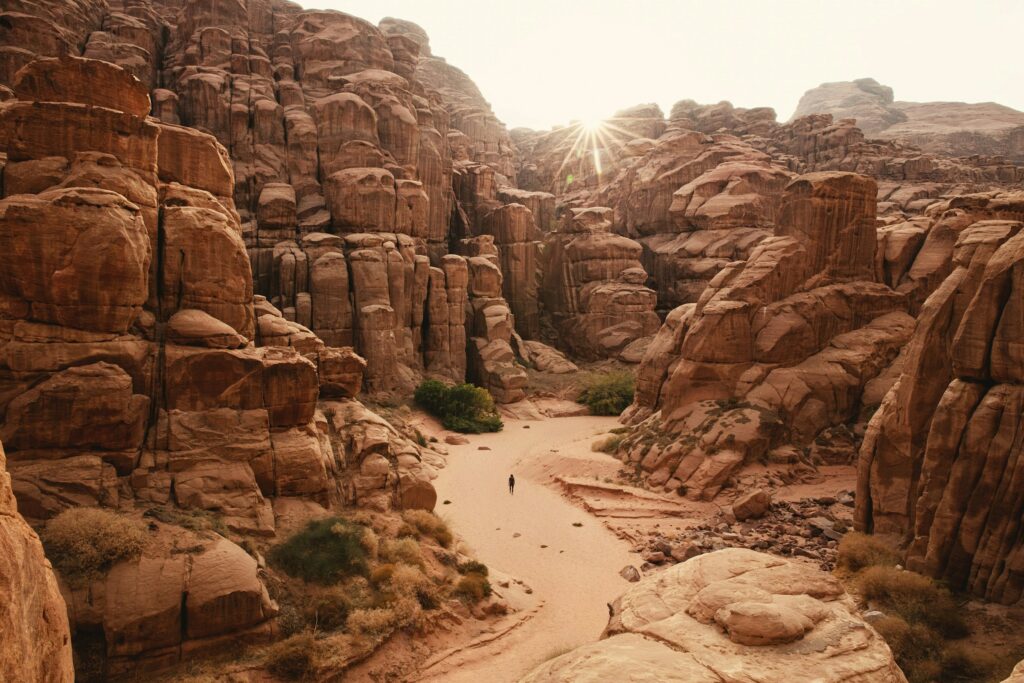Embarking on a career as a park ranger begins with a solid foundation in the natural sciences. Your passion for nature will need to be matched by knowledge in areas such as ecology, biology, and geology. These disciplines will equip you with the understanding necessary to manage and protect natural resources effectively. As you consider this career path, you’ll need to focus on academic and practical experiences that foster a deep appreciation and comprehension of the environment.
Many park rangers hold degrees that underscore their commitment to conservation and wildlife management. It’s not just about patrolling parks; it’s about becoming a steward of nature. To truly thrive, you’ll need to absorb the complexities of ecosystems and the intricacies of flora and fauna. Your education will be the bedrock upon which you build a career dedicated to preserving the very essence of our wild spaces.
The Role of a Park Ranger: Duties and Responsibilities
As a park ranger, you’ll be the face of conservation efforts and the first point of contact for park visitors. Your role will encompass a diverse range of duties, from enforcing park regulations and maintaining trails to providing educational programs and responding to emergencies. You’ll ensure that visitors have safe and enjoyable experiences while fostering a spirit of environmental stewardship. Your presence in the park will be pivotal in balancing human activities with the preservation of natural habitats.
Core Responsibilities and Daily Tasks
Day-to-day, your responsibilities as a park ranger will involve routine patrols and the maintenance of park facilities. You’ll keep a vigilant eye on the park’s wildlife and plant life, noting any changes or potential threats. Whether you’re clearing trails or guiding educational tours, each task contributes to the park’s overall health and the safety of its visitors. You’ll also be tasked with enforcing regulations, ensuring that everyone who comes through the gates respects the delicate balance of nature within the park’s confines.
Additionally, you’ll spend time interacting with visitors, providing information on the park’s history, geography, and available activities. From leading guided tours to conducting environmental education programs, your role is multifaceted. You’ll be an educator, a custodian, and sometimes, a first responder, ready to handle any situation that arises with calmness and expertise. Your comprehensive understanding of park operations will be essential in executing these daily tasks efficiently.
Specializations Within Park Ranger Roles
Within the park ranger profession, there are several areas of specialization that you might pursue. Some rangers focus on law enforcement within the park, protecting wildlife and visitors alike. Others may concentrate on interpretation and education, creating programs that inform and inspire the public. Specializations such as these allow you to tailor your career to your interests and strengths, ensuring that your work as a park ranger is both fulfilling and impactful.
For instance, you could become a wildlife inspector, where your primary function would be to monitor animal populations and their habitats, ensuring the health and sustainability of ecosystems. Alternatively, you might find your niche in park management as a forester, where you would oversee the care and regeneration of woodlands within the park’s boundaries. Each specialization requires a unique set of skills and knowledge, allowing you to contribute to park stewardship in a way that resonates with your passion for nature.
Wildlife Inspector Functions
As a wildlife inspector, your role will be critical in monitoring and protecting the diverse species that inhabit the park. You will conduct field surveys, track wildlife health, and investigate any incidents of poaching or habitat destruction. Your expertise will be pivotal in developing conservation strategies and informing the public about the importance of preserving biodiversity. Through your efforts, you’ll ensure the vitality of the park’s ecosystems for generations to come.
The Role of Foresters in Park Management
In the realm of park management, foresters play a vital role in maintaining the health of forest ecosystems. You’ll develop management plans for forested areas, oversee reforestation efforts, and work to prevent the spread of disease and invasive species. Your knowledge of tree species and forest ecology will be indispensable in these tasks. As you safeguard the woodlands, you’ll also collaborate with other park staff to integrate forest management with broader conservation objectives.
Moreover, your work will not only involve the practical aspects of forestry but also public education. You’ll have opportunities to lead tours and educational programs, sharing the significance of forest resources with visitors. By combining field expertise with communication skills, you’ll help to foster an appreciation for the park’s timberlands while ensuring their sustainable use and protection.

Preliminary Steps: Beginning Your Journey as a Park Ranger
Your journey to becoming a park ranger starts with familiarizing yourself with the department of parks and recreation and its mission. Understanding the scope of their work and the impact it has on conservation will guide you in aligning your career aspirations with the department’s goals. It’s important to recognize the various roles within the department and determine where your interests best fit. This knowledge will serve as a foundation for the steps you’ll take towards fulfilling your dream of becoming a park ranger.
Begin by researching the requirements set by the department for potential rangers. These can vary by state and may include specific educational backgrounds, physical fitness standards, and other qualifications. As you gather this information, consider how your current skills and experiences can be augmented to meet these standards. Taking the initiative to prepare yourself thoroughly will put you on the path to a successful career in park management.
Understanding the Minimum Criteria for Park Ranger Candidates
Before you can don the ranger uniform, you must understand and meet the minimum criteria for candidates. One such requirement is the ability to operate a motor vehicle, as rangers often patrol large areas and need to respond quickly to incidents. This typically necessitates a valid driver’s license and a clean driving record. Additionally, you must be physically capable of performing the duties of a ranger, which can include hiking, lifting, and sometimes working in challenging conditions.
Apart from these, there are often age and education requirements to consider. Most agencies require candidates to be at least 18 years old and to have a certain level of education—usually a high school diploma or equivalent. Some positions may require additional education or experience, especially those involving specialized tasks or leadership roles. It’s crucial to review the specific criteria for the park system you’re interested in to ensure you’re on the right track.
Different Work Environments for Park Rangers
Work environments for park rangers can vary significantly, from the remote backcountry to urban parks. You might find yourself in a dense forest, a desert landscape, or even a historical site. Each setting presents unique challenges and learning opportunities, and you’ll need to adapt your skills and knowledge to effectively manage the area under your care. Regardless of the environment, your role will be to protect natural resources and ensure a safe, enjoyable experience for all visitors.
Academic Pathways: Navigating Education Requirements for Park Rangers
The academic pathways to becoming a park ranger are rooted in the natural sciences and wildlife biology. Educational programs that focus on these areas provide the theoretical knowledge and practical skills necessary for the job. As you embark on your educational journey, you’ll likely engage in college coursework that covers a range of topics, from environmental policy to botany. This foundational knowledge is crucial as it informs the decisions you’ll make in the field and helps you interpret the landscape for visitors.
Furthermore, physical fitness is a component that cannot be overlooked. Rangers are often required to lead guided tours and perform physically demanding tasks. To excel, you’ll need to maintain a level of fitness that allows you to traverse challenging terrains and respond to emergencies. Civil service exams and other strict pre-employment processes also play a role in the hiring of park rangers, so it’s important to prepare for these as part of your educational and training programs. The culmination of these efforts will meet the education requirements and help you secure a position in this rewarding field.
Degree Programs and Fields of Study
For those committed to a career as a park ranger, pursuing a degree in natural resource management is a strong move. This field of study provides an in-depth understanding of how to balance the use of natural resources with conservation efforts. Coursework typically includes subjects such as wildlife management, environmental law, and park administration. By acquiring a specialized degree, you’re not only showing dedication to the profession but also equipping yourself with the expertise needed to excel in a variety of park ranger roles.
Importance of Environmental Science and Related Disciplines
Environmental science and related disciplines form the backbone of park ranger education. These fields offer the scientific grounding necessary to understand and manage natural ecosystems effectively. As you delve into topics like conservation biology, meteorology, and soil science, you’ll gain a holistic perspective on environmental issues. This knowledge is crucial for making informed decisions that impact the health of the park and its inhabitants.
Moreover, the interdisciplinary nature of environmental science ensures that you’re well-versed in the interconnectedness of various ecological factors.

Practical Experience: Enhancing Candidacy through Hands-On Learning
Hands-on learning is a pivotal step in becoming a park ranger. Many agencies require applicants to possess education from an accredited college or university, as well as experience in areas like outdoor recreation or park management. For instance, having completed 60 semester hours in natural resources management can significantly bolster your candidacy. Additionally, experience at nature centers or outdoor education centers can provide you with the practical skills needed to excel in the role. Park ranger applicants are often expected to demonstrate a blend of academic knowledge and real-world experience, making internships and volunteer work invaluable to your career development.
Internships and Volunteer Opportunities
Internships and volunteer opportunities at nature centers and outdoor education centers can be instrumental in your journey to becoming a park ranger. These experiences allow you to apply your academic knowledge in real-world settings, giving you a taste of the daily responsibilities of a ranger. Whether it’s trail maintenance, visitor outreach, or environmental monitoring, each task will deepen your understanding of park operations and the importance of conservation work.
Certifications and Additional Training for Prospective Park Rangers
Prospective park rangers should consider obtaining relevant certifications and additional training to enhance their qualifications. Academy training programs are specifically designed to equip park ranger recruits with the skills necessary for the job, such as first aid, emergency response, and natural resource law enforcement. Knowledge of hunting and fishing regulations is also essential, as is understanding the policies of the department of conservation. These certifications can set you apart from other candidates and demonstrate your readiness to take on the responsibilities of the role.
Moreover, the hiring process for state park rangers often includes strict pre-employment processes to assess candidates’ fitness for the position. These may involve background checks, physical fitness tests, and interviews.
Professional Growth: Opportunities and Outlook for Park Rangers
As a park ranger, your journey doesn’t end with securing your position; it’s a career path ripe with growth potential. With post-secondary education and hands-on experience, rangers can aspire to higher roles, ranging from supervisory positions to specialized fields like environmental education or law enforcement. The landscape of opportunities is as diverse as the parks themselves, allowing for a fulfilling trajectory in public service and conservation.
Advancement often means taking on greater responsibilities, managing larger territories, or focusing on specific conservation efforts. The key to professional growth lies in a combination of further education, experience, and a deepening commitment to preserving natural spaces. Keep an eye on emerging trends and policies that affect the environment, as they often bring new opportunities for rangers to lead and innovate within the field.
The Job Demand for Park Rangers
The allure of the great outdoors and the importance of conservation have seen a steady demand for park rangers. As guardians of natural resources, rangers often wear multiple hats, including that of customer service, ensuring that visitors have safe and informative experiences. While competition for these roles can be high, the demand remains consistent, reflecting the public’s ongoing interest in accessible and well-maintained natural spaces.
Advancing in the Field: Long-Term Career Development for Park Rangers
For those dedicated to a career as a park ranger, the path doesn’t plateau at entry-level. There are ample opportunities for rangers to climb the ranks, assuming roles with greater leadership and management responsibilities. These advancements typically come with not only increased salary potential but also the chance to make a larger impact on park policies and conservation efforts.
Maintaining a trajectory of growth often involves a commitment to ongoing learning and skill development. Whether it’s through formal education or on-the-job training, staying current with the latest environmental practices and leadership techniques is essential. It’s this continual evolution that can lead to a rewarding, lifelong career in park management.
Leadership and Management Opportunities
Park rangers with a desire to lead find numerous avenues to advance into management positions. These roles require a blend of field experience and the ability to oversee projects, teams, or entire park operations. Leadership positions often involve strategic planning, budget management, and the implementation of policies that ensure the integrity and sustainability of park environments.
Continuing Education and Lifelong Learning in Park Management
In the dynamic field of park management, continuing education is a cornerstone of career longevity and success. Rangers often pursue additional qualifications in areas like wildlife management, fire control, or ecological preservation. These educational pursuits not only enhance a ranger’s expertise but also bolster their ability to adapt to changing environments and conservation challenges.
Lifelong learning might include attending workshops, conferences, or earning advanced degrees, all aimed at enriching a ranger’s knowledge base. This dedication to growth ensures that rangers remain at the forefront of conservation efforts, equipped with the skills necessary to protect and manage our natural resources effectively.
The Application Process: Securing a Position as a Park Ranger
The journey to becoming a park ranger begins with a thorough application process. Most park ranger positions require a bachelor’s degree in a relevant field such as environmental science or biology. In addition, candidates must possess a valid driver’s license and undergo a background investigation to ensure they meet the high standards of trust and reliability expected of rangers.
Furthermore, applicants are often subjected to a psychological evaluation to assess their suitability for the rigors of the job. These steps are critical in selecting individuals who are not only academically prepared but also mentally and emotionally equipped to handle the diverse challenges of the profession.
Conclusion: Park Ranger Education Requirements
Choosing a career as a park ranger offers a unique blend of challenges and rewards, whether you find your calling in state and federal parks or dedicated recreational areas. Your journey begins with a thorough application process, but the outcome leads to a fulfilling role where you can educate visitors on the importance of nature and conservation efforts. As a ranger, your days can range from engaging in manual labor to preserve the beauty of our natural spaces, to participating in rescue operations that safeguard both wildlife and guests.





